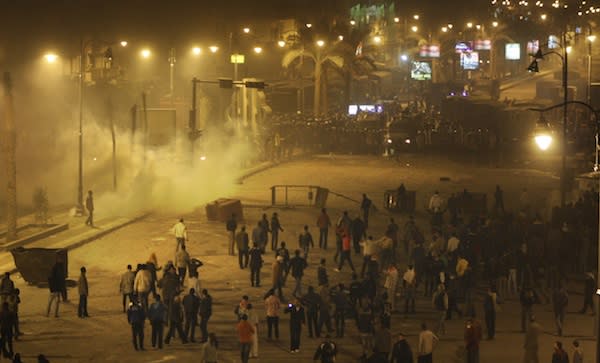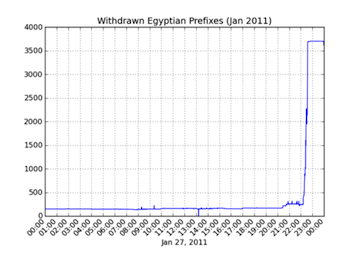 The Cutline
The CutlineJournalists cover Egypt protests despite Internet shutdown, police harassment

Egypt's authoritarian government has long repressed the media. And as Egyptian protesters turned to social media sites this week—such as Twitter and Facebook—the Mubarak government disrupted those communication tools, too. Now, Egypt's leaders have gone a step further in stifling communications: they've shut down the Internet.
Renesys, an Internet monitoring firm, reported Thursday night that "in an action unprecedented in Internet history, the Egyptian government appears to have ordered service providers to shut down all international connections to the Internet."
James Cowie, writing on Renesys blog, described how Egyptians rely on four major Internet providers to get services that are now all off the air. In a graph that's made the rounds since Thursday night, Renesys shows how "virtually simultaneous withdrawal of all routes to Egyptian networks in the Internet's global routing table."

"This is a completely different situation from the modest Internet manipulation that took place in Tunisia, where specific routes were blocked, or Iran, where the Internet stayed up in a rate-limited form designed to make Internet connectivity painfully slow," he wrote. "The Egyptian government's actions tonight have essentially wiped their country from the global map."
Clearly, it's not going to be easy for journalists to get news out of Egypt on Friday as the government tries cutting communications and sanctioning violence against protesters and the press. There have been numerous reports on Twitter—many with the hashtags #jan25 and #jan28—that satellite news networks are also down in Egypt
Still, journalists are filing reports and moving images out of the country.
Al Jazeera has several correspondents on the ground in Egypt, while also reporting that one was harassed by police. Just today, The New York Times described Al Jazeera's influence in helping shape the narrative around the revolts in Tunisia and Egypt and for extensive coverage of events it's worth checking out the network's English-language feed here.
But U.S. networks are also finding ways to cover Friday's "Day of Anger" despite attempts to shut down communications. Egyptian officials have also blocked ABC News' satellite feed in Cairo, according to New York Times reporter Brian Stelter, so reporter Lama Hasan is filing by phone.
Ben Wedeman, one of CNN's three corrrespodnents in Egypt, has found a way to tweet updates, which the cable news network has highlighted on "American Morning."
"Plainclothed #Egypt policemen in Tahrir Sq attack #CNN crew, brake and steal camera. Violent suppression of protesters everywhere," Wedeman tweeted.
"So far today?" Wedeman wrote in another tweet. "Attacks on protesters, press. Internet, cell phone service cut. Nobel laureate arrested. And day still young."
Update: Here are a few more updates on media coverage out of Egypt, mostly via Twitter.
The AP reports that four French journalists were arrested and have now been released. CNN reported that "Cairo police are stripping cameras from tourists as well as journalists," according to NPR's David Folkenflik. Also, CNN's Kyra Phillips said on-air that the network's "satellites had been cut off," Stelter tweeted.
And at around 10:30 EST, Al Jazeera reported on air that Egyptian state security have entered the building where they—along with other media outlets—broadcast. The network remains on air.
(Photo of Egyptian riot police clashing with anti-government protesters in Suez, Egypt on Jan. 27, 2011: AP Photo)

